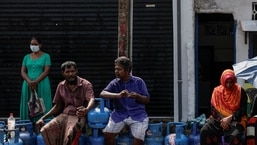
A large U.S. study looking at whether vaccination protects against long covid showed the shots have only a slight protective effect: Being vaccinated appeared to reduce the risk of lung and blood clot disorders, but did little to protect against most other symptoms.
The new paper, published Wednesday in Nature Medicine, is part of a series of studies by the Department of Veterans Affairs on the impact of the coronavirus, and was based on 33,940 people who experienced breakthrough infections after vaccination.
The data confirms the large body of research that shows vaccination greatly reduces the risk of death or serious illness. But there was more ambiguity regarding long covid.
Six months after their initial diagnosis of covid, people in the study who were vaccinated had only a slightly reduced risk of getting long covid — 15 percent overall. The greatest benefit appeared to be in reducing blood clotting and lung complications. But there was no difference between the vaccinated and unvaccinated when it came to longer-term risks of neurological issues, gastrointestinal symptoms, kidney failure and other conditions.
“This was disappointing,” said Ziyad Al-Aly, lead author and chief of research and development service at VA Saint Louis Health Care System. “I was hoping to see that vaccines offer more protection, especially given that vaccines are our only line of defense nowadays.”
“Long covid” refers to the constellation of symptoms that many people have reported months after their initial infections. Early in the pandemic, some patients who complained of lingering symptoms were dismissed by physicians who thought the manifestations might be psychological. But the condition has since become a major concern for the medical community.
The World Health Organization has defined post-covid syndrome as symptoms that last for at least two months and cannot be explained by alternate diagnoses. It cited evidence suggesting that as many as 20 percent of the half-billion people worldwide estimated to be infected with coronavirus may experience mid- and long-term effects.
This week, the Centers for Disease Control and Prevention released new estimates of the syndrome’s toll in the United States, suggesting it affects one in five adults younger than 65 who had covid, and one in four of those aged 65 and older. People in both age groups had twice the risk of uninfected people of developing respiratory symptoms and lung problems, including pulmonary embolism, the CDC found. Those in the older age group were at greater risk of developing kidney failure, Type 2 diabetes, neurological conditions and mental health issues.
The Veterans Affairs study, believed to be the largest peer-reviewed analysis in the United States on long covid based on medical records, looked at patients who either had two doses of the Moderna or Pfizer—BioNTech vaccines, or one dose of the Johnson & Johnson vaccine. It did not assess the impact of booster shots. While the study population contained a wide range of ages and racial and ethnic backgrounds, it did skew older, Whiter and more male than the United States as a whole.
The VA study also had no way to tell how different variants may change the risk of long covid. These breakthrough infections, for example, took place at a time when alpha, delta and prior variants were at high levels in the United States. It does not cover the period when the omicron variant and its subvariants began circulating in late 2021.
The findings add to the debate surrounding similar analyses trickling out from the United Kingdom, Israel and other countries that have shown conflicting results in terms of whether vaccines protect against long covid.
One British study published in the medical journal Lancet, for example, based on self-reported data from an app, showed a 50 percent reduction in risk among those who were vaccinated. On the other hand, a paper by University of Oxford researchers based on electronic records from the United States found that vaccination did not appear to reduce the risk of long covid for most symptoms.
The question of vaccines and long covid has been a critical one for doctors. Some patients have claimed a vaccine has cured them, while others have avoided the shots for fear of triggering symptoms.
Igor Koralnik, chief of neuro-infectious diseases at Northwestern Medicine, said recent research suggests neither is true. In a paper published in the Annals of Clinical and Translational Neurology on Tuesday, Koralnik and his colleagues found that 77 percent of the 52 long-covid patients they are following had been vaccinated against the coronavirus, but the shots did not appear to have a positive or negative impact on cognitive function or fatigue.
“There is a neutral effect of vaccination. It didn’t cure long covid. It didn’t make long covid worse,” Koralnik said.
At the Dartmouth Hitchcock Medical Center’s Post-Acute COVID Syndrome Clinic, Christina Martin, an advance practice nurse, said that since November, her staff has noticed a “worrying trend” of vaccinated people having breakthrough infections and developing long covid.
When the clinic was founded a year ago, she said, they anticipated seeing fewer new patients by this time as more people became vaccinated. Unfortunately, they’ve seen the opposite, with patient numbers going up.
“We now feel that long covid is here to stay. … This will have profound implications on our health-care system and resources,” Martin said.
David Putrino, a long-covid researcher who serves as director of rehabilitation innovation at the Mount Sinai Health System in New York, shares those concerns. He worries that public health leaders are not taking the current surge seriously enough because they are discounting the risks of long covid.
Putrino said that demand for appointments at his medical center’s long covid clinic continues to increase and he does not anticipate a slowdown any time soon. The clinic has seen about 2,500 patients since opening in May, 2020.
“We failed in our health messaging that death is not the only serious outcome of a covid-19 infection,” Putrino said. “. . . I’m very concerned that what this is going to do is lead us into a continuation of this mass-disabling event we are seeing with long covid.”
Vaccines may not prevent many symptoms of long covid, study suggests - The Washington Post
Read More











